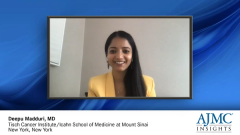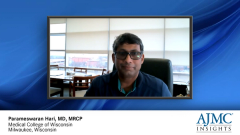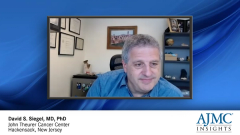
CAR T-Cell Therapy for RRMM: Patient Care
Typical adverse events associated with the use of CAR T-cell therapy for relapsed/refractory multiple myeloma and recommendations for managing patients during and after treatment.
Episodes in this series

Deepu Madduri, MD: Typically, after CAR [chimeric antigen receptor] T-cell therapy is done, some of the things to look out for include: some of these patients are cytopenic, meaning they may need to get some Neupogen [filgrastim] injections, because their white [blood cell] count is low. They may need some red blood cell transfusions or platelet transfusions if their counts haven’t recovered. Usually, the median time to recovery is anywhere from 2 weeks to 8 weeks for some of the various trials. They may need to come into clinic to get transfusion support. They may also need to get IVIg [intravenous immunoglobulin] if their IgG [immunoglobulin G] level is low because they are immunosuppressed. Additionally, we typically see them once a month for routine blood work and to make sure that they’re doing OK, and to monitor for any long-term toxicities.
David S. Siegel, MD, PhD: The toxicity spectrum of CAR T cells is complicated, so the main place that adult oncologists use CAR T cells right now is in the wide spectrum of B-cell lymphomas. But certainly, it seems to me that the multiple myeloma CAR T-cell platforms that we have been using here at Hackensack [John Theurer Cancer Center] are easier than the ones than the ones that we’ve been applying for patients with lymphoma. Notably, adverse events and safety considerations are the critical thing. The worst thing that happens is when we do something, and it hurts the patient. They have enough to deal with based on the hands they were dealt without us adding to that. We empirically are figuring out what are the best ways to treat these things.
As the number of patients being treated expands, and this will be accelerated once the myeloma CAR T cells become commercially available, we have to be very careful that we track the kinds of toxicities that we’re seeing, track the kinds of interventions that we make, and then put those things together and see where we get the best outcomes. We certainly have a lot to learn. I think one of the sad things about medicine in America is that we don’t have these global networks that force us to gather the entire spectrum of things, and then have databases that allow us to go back and examine what was done in particular kinds of patients, and which interventions have worked. Some of the countries outside of the United States are much more advanced in terms of analyzing that kind of data.
I think that one of the things the regulators must do as we move forward is to say that if we’re going to use these kinds of therapy, you need to collect this information. It needs to go into a public database. That public database must be available for analysis so we can iteratively improve what we’re doing.
Newsletter
Stay ahead of policy, cost, and value—subscribe to AJMC for expert insights at the intersection of clinical care and health economics.






